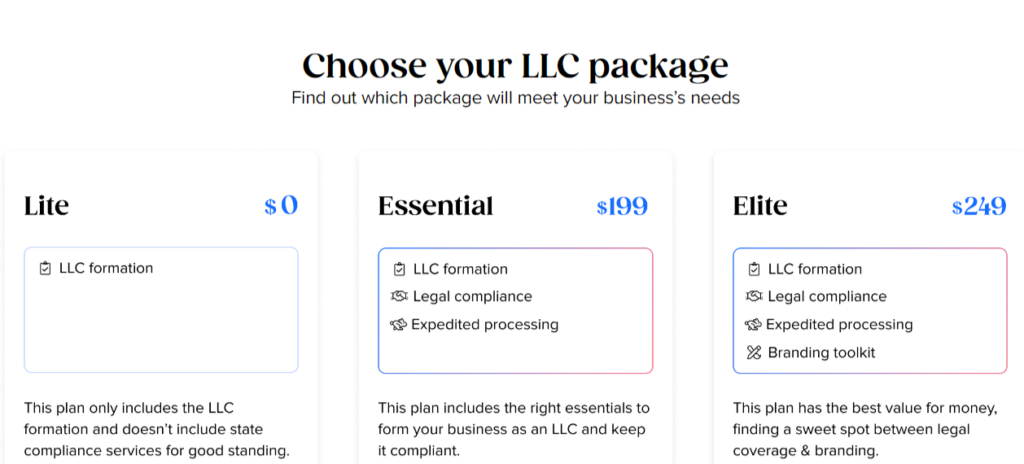

Starting your own LLC in Nevada opens a path filled with various costs and considerations, not just the basic paperwork. But don’t worry, it looks scarier than it really is. We’re here with top-notch LLC services like Tailor Brands that can make a big difference. They help you find smart ways to cut down on expenses.
In this article, we dive into what it really costs to set up an LLC in Nevada and show you how to keep your finances in check.
The main expense to get your LLC started in Nevada is a $425 fee. This covers the online submission of your LLC’s Articles of Organization, Initial List, and Business License Fee with the Nevada Secretary of State.
If you own an LLC registered in another state, and you want to expand your business into Nevada, you’ll need to register your LLC as a foreign entity there. This process includes a fee of $425 and requires submitting an Application for Registration of Foreign Limited-Liability Company, which you can also send by mail.
Maintaining an LLC in Nevada requires understanding ongoing costs crucial for effective financial management. Knowing these expenses helps with budgeting and ensuring your LLC’s financial health.
Key ongoing costs for a Nevada LLC include an annual list filing fee of $150 to keep member information current with the state, a $200 business license fee, a fictitious firm name renewal fee of $20 every five years (according to Clark County rules), and a registered agent fee that ranges from $100 to $300 annually, depending on the service provider.
Factoring these costs into your financial plan is vital for making informed decisions and keeping your LLC financially healthy.

The starting cost to register an LLC in Nevada is $425, but this can change based on specific needs. Normally, it takes 2 to 3 weeks to process, but you can speed it up. For an extra $50, you get your registration done in 4 to 6 days, or even quicker, 1 to 2 days for an additional $100.
Tailor Brands Lite LLC’s plan is the most wallet-friendly, charging only state fees for basic LLC formation with standard processing times. Their Essential LLC plan runs for $199 plus state fees. It speeds up the process, adds annual compliance, and throws in an operating agreement. To keep these perks, there’s a $199 annual charge.
The Elite LLC plan, priced at $249 plus the state fees, includes everything from the Essential and tosses in a bunch of cool extras. Think of a free business domain for the year, a DIY website builder, an online store, eight nifty logos, a digital business card, a tool for creating business cards, and a gadget for whipping up social media posts. Enjoying these features after the first year will set you back $249 annually.
Choosing a name for your Nevada Limited Liability Company is free, and you don’t have to file a Name Reservation. Simply include your preferred LLC name on the Articles of Organization. Once the state approves your filing, your chosen Nevada LLC name is officially yours.
However, if you want to secure your name before officially forming the LLC, you can reserve it for up to 90 days. Just submit a Name Reservation Request with a $25 filing fee, which you can also send by mail.
In Nevada, you can choose to be your own Registered Agent at no cost, or you can pay $125 per year for a professional service. Nevada law requires every LLC to appoint a Registered Agent during the formation process. This agent is responsible for receiving legal documents and state notices on behalf of your LLC and must be available during normal business hours with a physical address in the state.
There are no extra charges if you decide to act as your own Registered Agent or if a friend or acquaintance takes on this role for your business.
However, you can also opt to hire a professional Registered Agent service, which typically costs between $100 and $300 annually. These services offer more than just basic agent duties; they provide additional business support and privacy protections.
Hiring a Registered Agent service might be the right move if:
The Nevada LLC Operating Agreement, available for free, is a formal document shared among LLC Members. It outlines detailed information about LLC ownership, management structure, and profit distribution methods. It’s recommended that both single-member and multi-member LLCs create an Operating Agreement, keep it with their business records, and provide each member with a copy.
However, most online services charge between $50 and $200 to draft LLC Operating Agreements.
Getting a Nevada LLC EIN Number for free, also known as an Employer Identification Number (EIN) or Federal Tax ID Number, is essential for tasks like filing income taxes, opening an LLC bank account, and hiring employees when needed. While many services charge a fee to issue an EIN, you can obtain it at no cost directly from the source.
The Internal Revenue Service (IRS) offers this service online, enabling you to secure your EIN quickly and free of charge.
Many Nevada LLC owners face a range of taxes, leading to significant differences in annual costs. Some of the taxes paid by LLC owners include:
The Internal Revenue Service (IRS) provides different federal income tax treatment options for your LLC, depending on its ownership structure.
For taxation, the IRS treats Single-Member LLCs as Disregarded Entities, implying that these LLCs are not required to file a separate federal income tax return. Instead, the owner of the LLC is responsible for reporting the income and paying taxes via their individual tax return.
If your LLC is owned by multiple people, it’s classified as a Partnership for tax purposes. The LLC is required to file a Form 1065 Partnership Return and issue Schedule K-1s to each owner. The owners must then report their share of the profits on their personal tax returns.
In community property states such as Nevada, a husband and wife who own an LLC together can choose to be treated as a Single-Member LLC (Qualified Joint Venture) for tax purposes. If they do not make this choice, their LLC automatically defaults to being taxed as a Partnership. This decision affects the way taxes are filed and paid.
An LLC has the option to be taxed as a Corporation, diverging from the default classifications. There are two corporate tax options available: S-Corporation and C-Corporation.
For S-Corporation Taxation (Elective Status): By submitting Form 2553, an LLC can opt for S-Corporation taxation, which may reduce self-employment taxes for established, profitable businesses.
For C-Corporation Taxation (Elective Status): By filing Form 8832, an LLC can elect to be taxed as a C-Corporation. This choice can offer advantages, such as improved healthcare fringe benefits for large employers.
Most LLCs in Nevada are treated as pass-through entities. Since Nevada does not impose a state income tax, individual owners report their share of the LLC’s income on their personal tax returns. However, this arrangement is specific to Nevada residents and does not apply to non-resident businesses that operate within Nevada.
In Nevada, LLCs that do business and generate revenue exceeding $4 million are subject to the Commerce Tax. Businesses that earn less than this threshold are not required to file a Commerce Tax Return. Additionally, there may be taxes specific to certain industries that could also apply.
In Nevada, both LLCs and individuals might need to meet local income tax requirements set by their municipalities. To comply, they must file and pay these taxes, and it’s recommended to seek professional help for guidance.
LLCs that sell products in Nevada are required to collect sales tax. To do this, they need a Seller’s Permit from the Nevada Department of Taxation. The amount of sales tax collected depends on the customer’s location.
A Resale Certificate allows LLCs to avoid paying sales tax on items purchased for resale. This is particularly crucial for businesses in the manufacturing or retail sectors.
LLCs with employees are responsible for handling payroll taxes. This includes withholding federal and state income taxes, as well as Social Security, Medicare, and unemployment taxes. In Nevada, one of the taxes applicable to businesses with employees is the Modified Business Tax (MBT).
This tax, paid by employers, supports individuals who are unemployed. It’s managed by the Nevada Employment Security Division and forms a part of the Unemployment Insurance system.
Under Nevada’s unemployment laws, LLCs with employees must pay the Modified Business Tax (MBT), which is calculated from gross wages after deducting health care benefits. This tax is distinct from federal payroll taxes and requires a separate registration process.
What Are the Expenses Involved in Forming an LLC in Nevada?
The total cost to establish an LLC in Nevada is $425. This amount covers the filing of the Articles of Organization ($75), the acquisition of the State Business License ($200), and the submission of the Initial List of Managers or Managing Members ($150). A state business license is mandatory for all LLCs in Nevada.
However, the costs for additional licenses required by certain industries or local jurisdictions may vary. Moreover, the nature of your LLC’s operations may necessitate obtaining business insurance.
How Much Does an LLC in Nevada Cost Per Year?
To maintain the active status of a Nevada LLC, you must pay a mandatory annual fee of $150 to file the List of Members/Managers, along with an additional $200 for renewing the State Business License. Unlike some states, Nevada doesn’t require a formal “annual report”; only the List of Managers needs to be submitted.
If you’ve engaged the services of a Registered Agent company, you can expect to pay an annual subscription fee of around $125.
Certain Nevada LLCs may require an industry-specific business license depending on their sector and location. To determine whether there are any annual renewal fees associated with the business permit, it’s crucial to consult your local municipality.
Should I Hire an LLC Formation Service?
While it’s not obligatory, you have the option to either manage the formation of your Nevada LLC independently or seek professional assistance. However, for those seeking efficient and precise filing, it’s advisable to consider the services of Tailor Brands.
Renowned for their exceptional customer support, they also provide additional benefits such as creating an Operating Agreement and handling the submission of Annual Reports.
Establishing an LLC in Nevada entails more than just the initial formation fee. It involves acquiring documentation, engaging registered agents, addressing essential aspects such as operating agreements, and obtaining an EIN. Efficient financial handling in these aspects is vital, underscoring the significance of specialized LLC services such as those offered by Tailor Brands.
By comprehending the intricate expenses and leveraging expert assistance, entrepreneurs can confidently establish their Nevada LLC, laying a robust groundwork and fostering a conducive environment for sustained success.